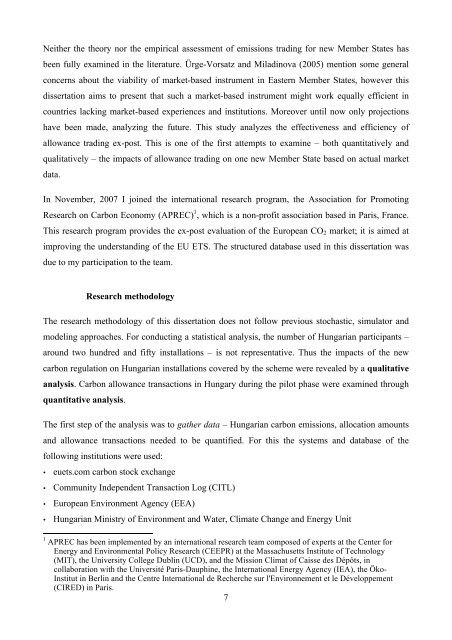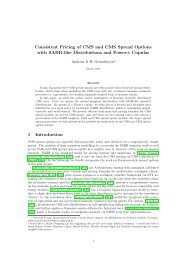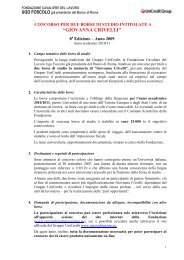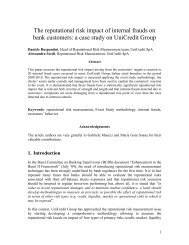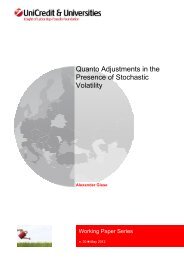Dóra Fazekas Carbon Market Implications for new EU - UniCredit ...
Dóra Fazekas Carbon Market Implications for new EU - UniCredit ...
Dóra Fazekas Carbon Market Implications for new EU - UniCredit ...
You also want an ePaper? Increase the reach of your titles
YUMPU automatically turns print PDFs into web optimized ePapers that Google loves.
Neither the theory nor the empirical assessment of emissions trading <strong>for</strong> <strong>new</strong> Member States has<br />
been fully examined in the literature. Ürge-Vorsatz and Miladinova (2005) mention some general<br />
concerns about the viability of market-based instrument in Eastern Member States, however this<br />
dissertation aims to present that such a market-based instrument might work equally efficient in<br />
countries lacking market-based experiences and institutions. Moreover until now only projections<br />
have been made, analyzing the future. This study analyzes the effectiveness and efficiency of<br />
allowance trading ex-post. This is one of the first attempts to examine – both quantitatively and<br />
qualitatively – the impacts of allowance trading on one <strong>new</strong> Member State based on actual market<br />
data.<br />
In November, 2007 I joined the international research program, the Association <strong>for</strong> Promoting<br />
Research on <strong>Carbon</strong> Economy (APREC) 1 , which is a non-profit association based in Paris, France.<br />
This research program provides the ex-post evaluation of the European CO2 market; it is aimed at<br />
improving the understanding of the <strong>EU</strong> ETS. The structured database used in this dissertation was<br />
due to my participation to the team.<br />
Research methodology<br />
The research methodology of this dissertation does not follow previous stochastic, simulator and<br />
modeling approaches. For conducting a statistical analysis, the number of Hungarian participants –<br />
around two hundred and fifty installations – is not representative. Thus the impacts of the <strong>new</strong><br />
carbon regulation on Hungarian installations covered by the scheme were revealed by a qualitative<br />
analysis. <strong>Carbon</strong> allowance transactions in Hungary during the pilot phase were examined through<br />
quantitative analysis.<br />
The first step of the analysis was to gather data – Hungarian carbon emissions, allocation amounts<br />
and allowance transactions needed to be quantified. For this the systems and database of the<br />
following institutions were used:<br />
• euets.com carbon stock exchange<br />
• Community Independent Transaction Log (CITL)<br />
• European Environment Agency (EEA)<br />
• Hungarian Ministry of Environment and Water, Climate Change and Energy Unit<br />
1<br />
APREC has been implemented by an international research team composed of experts at the Center <strong>for</strong><br />
Energy and Environmental Policy Research (CEEPR) at the Massachusetts Institute of Technology<br />
(MIT), the University College Dublin (UCD), and the Mission Climat of Caisse des Dépôts, in<br />
collaboration with the Université Paris-Dauphine, the International Energy Agency (IEA), the Öko-<br />
Institut in Berlin and the Centre International de Recherche sur l'Environnement et le Développement<br />
(CIRED) in Paris.<br />
7


